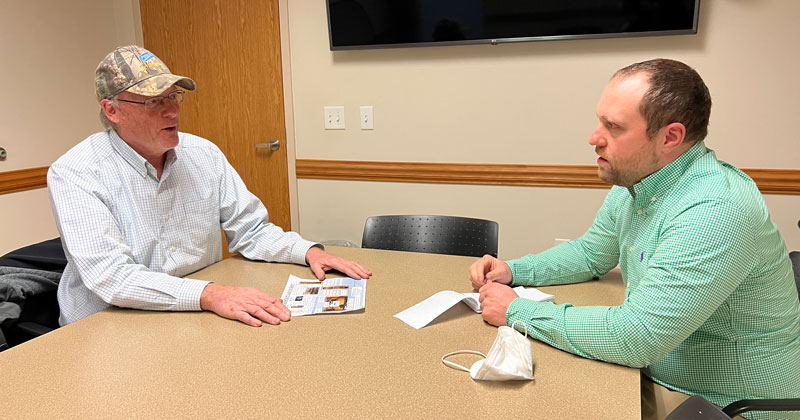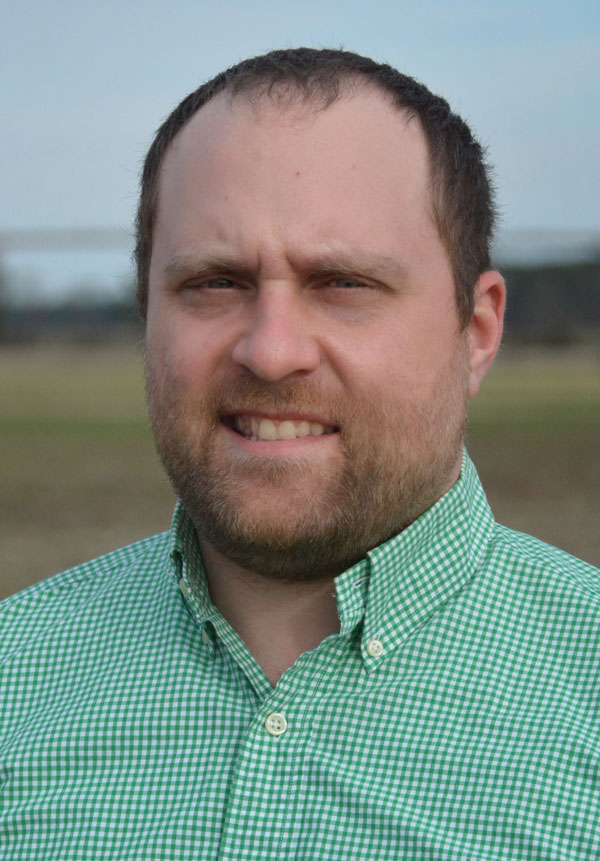


UD's first-ever farm business management specialist
Photos by Michele Walfred April 12, 2022
Nate Bruce’s new role serves agriculture at a challenging time
For farm families in Delmarva, a new ally has arrived. University of Delaware Cooperative Extension has hired Nate Bruce as a farm business management specialist.
Working out of the UD Carvel Research and Education Center in Georgetown, Bruce is connecting with farmers who grow agronomic crops, produce or raise animals. The new hire is excited to counsel farmers throughout the state and the region with their business decisions during challenging economic times. His skillset is yet another example of Extension’s mission to offer University knowledge, research and resources to the people of Delaware.
“This position adds farm business management expertise to our UD team, which broadens our capability to provide the agricultural community with timely information, education, assistance and research,” said Cory Whaley, an extension agent in agronomic and vegetable crop production and the Sussex County extension director.

Many producers have already met Bruce virtually. He hit the ground running during Delaware Agriculture Month in January. While the sessions weren’t the person-to-person interactions that Bruce prefers, he used the opportunity to learn about the research conducted in Delmarva and the local challenges facing farmers.
During his studies, he interned with Mountaire, one of Delmarva’s largest poultry companies. The Hudson, Ohio, native distinctly recalls driving over the Chesapeake Bay Bridge. He was mesmerized by the acres upon acres of flat farmland along Maryland’s eastern shore and southern Delaware.
“It was a great experience for me really to learn the ins and outs of the poultry business,” said Bruce.
While in graduate school at the University of Tennessee, Knoxville, he worked as a research assistant in agricultural and resource economics.
“That was actually my first experience with Extension,” Bruce said. “I quickly discovered that Extension was my calling.”
After graduating from Tennessee, Bruce specifically sought an Extension position; he found a home at Caswell County, a small rural county in the Piedmont region of North Carolina.
“I was very blessed in my two years there,” remarked Bruce. “We helped a lot of producers with innovative grants.
When a recent trade war with China upended success with tobacco, Bruce worked with farmers to seek alternatives.
“We found a lot of success with produce,” Bruce remarked. “One of the things I learned is that farmers are very resilient. Looking at how they operate, the ones who are struggling are usually just missing one or two key components, either in management or with financial decisions.”
After two years with North Carolina Extension, Bruce worked for a small, family-ran agronomic operation, growing their customer base, contracting and buying from suppliers. Three years in the private sector gave him valuable insight, but he missed Extension and decided to return to outreach.
“I looked at the description and I said, that’s me,” Bruce remarked about seeing the new position at UD. “I needed to come back.”
And that meant a return to Extension and to Delaware, the region that intrigued him seven years earlier. Bruce’s arrival in the First State comes with his resume of successful case studies, each unique.
“Not everyone’s case is the same. I need to listen to the clues they give me. Farm business management planning is very personal,” observed Bruce. “What I provide is one-on-one education. The information is confidential to me. I do not share it. I am not regulatory.”
In a typical agronomy meeting, farmers will raise their hands to ask about issues with a pest or a disease. But for a financial issue, they aren’t as willing to talk.
Bruce plans to offer the financial analysis tool FinPack® to help area growers.
“If they are considering buying a large piece of equipment, purchase or lease new land, the tool will help them evaluate their decisions,” explained Bruce. “Having that service is beneficial to producers in the long run. When they go to lenders like Farm Services Agency (FSA), they will achieve greater success with their applications.”
In his experience, Bruce said, most farm-family business knowledge is passed through generations. He sees his formal expertise in business management and planning as a complement. A top priority for Bruce is improving farmers’ knowledge on marketing their products and incorporating value-added products. Cost accounting is also high on his list.
“It is important to know what you have in a crop, how much it costs to produce and what you need to make to recover the costs,” added Bruce. “That is definitely overlooked.”
With lingering effects of the pandemic, growers will face their most stressful year. Prices for almost everything have gone up — in some cases 300%. Essential materials are harder to get and all labor is in demand.
“It is a very challenging year, eclipsing the difficult farm crisis of 1981 to 1985,” remarked Bruce.
Still, Bruce sees hope in these foreboding times.
“I’ve seen dramatic turnarounds,” Bruce said. “Financial holes shifted to a positive.”
Bruce is eager to see that happen in Delmarva.
“I am here to evaluate what makes the most sense,” concluded Bruce. “What we do in Extension is like missionary work. We really make a difference.”
Delaware farmers can reach Nate Bruce at nsbruce@udel.edu or 302-362-7619.
Contact Us
Have a UDaily story idea?
Contact us at ocm@udel.edu
Members of the press
Contact us at 302-831-NEWS or visit the Media Relations website

